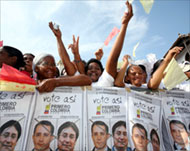Security tight as Colombians vote
Alvaro Uribe looks likely to win a second term in election in Colombia being held amid unprecedented security and a sharp drop in the political violence he has pledged to defeat.

Opinion polls before the presidential election put voter support for Uribe at 57.5%, and 36.5 points ahead of his closest rival, leftist senator Carlos Gaviria.
That would give Uribe, the clear majority he needs to win outright on Sunday and avert a run-off against the second-place candidate.
A yoga-practising workaholic, Uribe, 53, has gained strong popularity for battling violent crime and drug-funded insurgencies, but has also faced criticism for failing to focus more on social issues in a country where almost half the 41 million population lives in poverty.
An arch-foe of the leftist Revolutionary Armed Forces of Colombia (FARC) rebels who killed his father, Uribe has survived several assassination attempts since taking office in 2002, and has ordered unprecedented security measures for the election.
In all, 220,000 soldiers and police officers will be deployed to ensure the safety of the six presidential candidates and the 26.7 million voters called to the polls.
Security concerns
Security concerns remain high in this South American country, where four decades of political violence has claimed an estimated 200,000 lives.
But a study released on Saturday showed the level of violence against politicians during the current electoral campaign was the lowest in 20 years.
Over the past year, 50 politicians were reported murdered and five kidnapped, representing an 81% decrease from the same period ahead of the 2002 elections, according to the Security and Democracy Foundation.
 |
|
A sharp drop in violence has led |
Government figures also show a sharp drop in violence in general, with murders down from 36,000 in 2002 to 15,000 last year, and kidnappings down from 3,000 to 1,000.
The research group partly attributed the drop in violence to Uribe’s security policies, which increased the strength of the armed forces, stepped up the battle against leftist insurgents, and reached a deal that demobilised right-wing paramilitary fighters.
In addition, the FARC has pledged for the first time since 1998 that it would not seek to sabotage the voting, and actually encouraged Colombians to head to the polls, and vote against Uribe.
“I believe I am the president most hated by the guerrilla,” Uribe said at a news conference on Saturday.
He said that if he is re-elected, he would show “total firmness in combating terrorism and total generosity in negotiating peace”.
Warmonger
But the FARC has insisted it would not negotiate with Uribe, calling him a warmonger, and Gaviria claims Uribe has shown little interest in seeking negotiation, favouring instead a military solution to the conflict.
The leftist senator also accuses the president of selling out Colombia to US interests to the detriment of trade ties with other nations.
 |
|
Challenger Gaviria says Uribe has |
Colombia is the fourth largest recipient of US aid, and received more than $750 million from Washington last year. Much of the aid is used for drug eradication in the South American country, the world’s main cocaine producer and exporter.
Partly because of his co-operation in the US war on drugs, Uribe is considered Washington’s closest ally in Latin America, and the two governments recently reached an extended trade pact.
The continuing insecurity in the country, where the drug trade often finances left-wing insurgencies and paramilitary groups, was highlighted on Monday, when government soldiers shot dead 10 members of an elite, US-trained police commando that was hunting down a drug trafficker.
Authorities initially called the shooting in the southwestern city of Jamundi an accident, saying it was a case of mistaken identity, but Uribe on Saturday described it as “a massacre”, saying he would not allow “military crimes”.